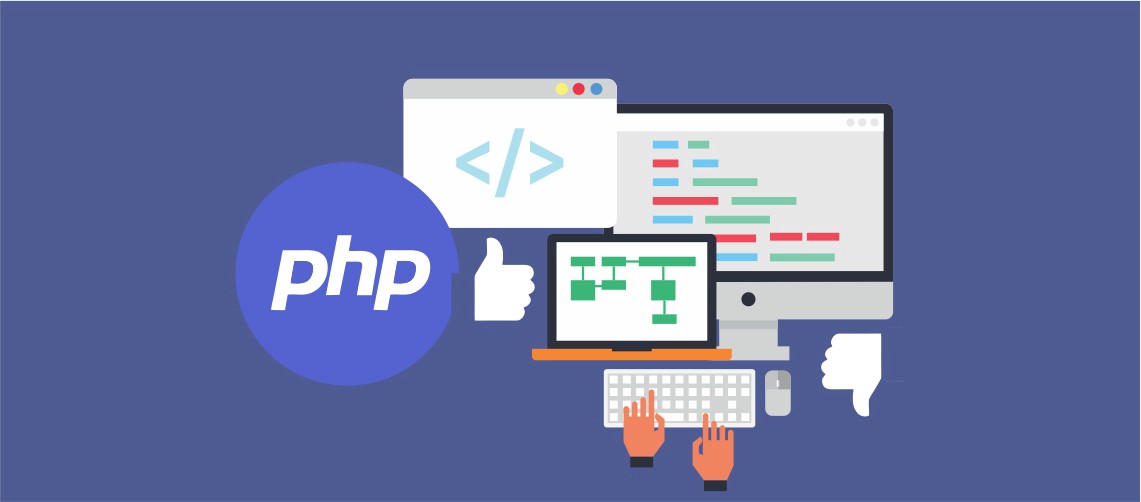
PHP Pros & Cons
PHP is a scripting language embedded in HTML, that is one of the finest Server-side Scripting languages ever created. PHP is widely used, in order to even build entire e-commerce sites. It is superb for session tracking, and managing content and databases. Perhaps the most popular scripting language in the world over the last few years, PHP is now said to face an uncertain future. While its attractiveness has diminished over the last two years , with the rapid advance of its competitors, it is still in high demand. This is the focus of this article, on some of the salient advantages and disadvantages of PHP.
Main Advantages
- Source: PHP is open source, and a general purpose scripting language that is especially suited for web development.
- HTML: PHP can be embedded into HTML.
- Command Structure: Instead of a large number of commands as in other scripting languages, the PHP code is enclosed in special start and end processing instructions, that allow the programmer to jump in and out of PHP mode in HTML easily.
- Server-side: One of the main distinguishing features of PHP is that it is a Server-side language. This means that the code is executed on the server, thus generating HTML, which is next sent to the client, unlike JavaScript, which is client-side. Thus, while the client can comfortably receive and use the results of running a particular script, the client would have no knowledge of the underlying code.
- Simplicity: One of the finest features of PHP is the extreme simplicity of its usage. Programmers and developers can start working in PHP very shortly after being introduced, in spite of the long list of PHP features.
Main Areas of Use: There are Three Main Areas of Use of PHP, which are
- Command Line Scripting: The PHP script can be made to run without a server or a browser, by using only a parser. This is perfect for use scripts executed using Linux or nix, or for simple text processing tasks.
- Server-side Scripting: This is the main usage area for PHP. Three things are necessary to make this work, which are CGI or server module (“parser”), a web server and a web browser. The complete setup can be run on a home computer or laptop for trials. The web browser can be used to access the PHP program output, while the server can be used to view the web page.
- Desktop Application Writing: This requires special skill and experience, but it is still within the realms of the possible. Graphical interfacing with PHP needs professional ability, and use of advanced PHP features. PHP-GTK can be used to write such programs on the client-side also, as well as cross-platform applications.
Operating Systems: PHP can be used on all major Operating Systems. Some of these are RISC OS, Microsoft Windows, Mac OS, Linux, almost all Unix variants including Solaris, HP-UX, and OpenBSD, and many others.
Web-server Support: PHP can support Apache, IIS and numerous others. Any web-server that can utilize the FastCGI PHP binary, such as nginx and lighttpd, can be supported by PHP, both as a CGI processor or a module.
Output: Along with the freedom to choose the web-server and the operating system, and outputting HTML, PHP can output PDF files, graphical content, and images. Using Ming and libswf, it can even output Flash Movies. Any XML file or XHTML file can be generated easily.
Databases: Database specific extensions can render writing a database enabled webpage incredibly easy to write in PHP. This can be done by using extraction layer like PDO, or extensions such as mysql. Any database supporting the Open Database Connection standard can be used to connect via the ODBC extension. Databases using CouchDB or similar cURL and sockets may also be utilized conveniently.
Talking To Other Services: The use of protocols such as HTTP, COM, SNMP, POP3, IMAP, LDAP, and so on make talking to other services very easy using PHP.
PHP Text-Processing Features: Perl-compatible regular expressions (PCRE) and several other features are part of PHP advantages.
Some Disadvantages
- Pace of Growth: PHP has not been able to sustain its pace of growth since 2016.
- Competition: It is said that very few people who try Python/Django or Ruby/Rails, return to practice PHP. Modern innovations are mainly the area of the competitors, as their applicability improves with each passing year. Other languages and the web frameworks that use them are getting stronger.
- Interpretation: PHP scripts can only be interpreted on a server that has PHP installed.
PHP is easy to learn and use, and has fantastic frameworks that are still available to write very productive and scalable code. But it is getting outdated. And this sums up the Advantages and Disadvantages of PHP.




